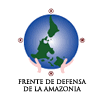Chevron Outed for Corporate Espionage Spy Scandal in Ecuador's Amazon Rainforest
Atlantic Magazine Exposes Offer to Journalist to Go Undercover to Sabotage $27 Billion Environmental Case

Amazon Defense Coalition
03 August 2010 - FOR IMMEDIATE RELEASE
Contact: Karen Hinton at +1.703.798.3109
Lago Agrio, Ecuador – Chevron, long accused of engaging in an illegal dirty tricks campaign in Ecuador, tried to recruit an American journalist to take part in a corporate espionage spy ring in Ecuador's Amazon to undermine an expected multi-billion judgment against the oil giant in a high-profile environmental lawsuit, according to an article published in the latest issue of The Atlantic.
Mary Cuddehe, an Iowa-born graduate of Columbia University with a Masters degree in Journalism, published an article documenting that the investigative firm Kroll has been running an espionage operation in Ecuador on behalf of Chevron, which faces a $27 billion damages claim for creating what experts believe is the worst oil-related catastrophe on the planet.
A Kroll employee offered Cuddehe $20,000 for six weeks of work to appear as an independent journalist while working as an undercover spy in Lago Agrio, Ecuador. Lago Agrio is the jungle town in the Amazon where the trial is being held at Chevron's request after the case was originally filed in New York federal court several years ago.
The Kroll employee, identified as a former journalist named Sam, paid for Cuddehe to travel to Bogota where the case was explained and she was offered the money in the suite of a luxury hotel. Cuddehe said in a blog that she has published articles in The New Republic, the Miami Herald, and for the Associated Press.
"Last February, I got an offer from Kroll ... to go undercover as a journalist-spy in the Ecuadorian Amazon," wrote Cuddehe in the article, titled "A Spy In the Jungle".
"At first I thought I was underqualified for the job. But as it turned out I was exactly what they were looking for: a pawn."
She added: "...there was a reason [Chevron] wanted me... If I went to Lago Agrio myself and pretended to write a story, no one would suspect that the starry-eyed young American poking around was actually shilling for Chevron."
Representatives for the Amazon communities who are victims of the environmental damage blasted Chevron and Kroll for engaging in corporate espionage. The article suggested that numerous Kroll employees were working on the Ecuador project from a base in neighboring Colombia.
With headquarters in New York, Kroll is considered the largest investigative firm in the world and is publicly traded.
"This is disturbing evidence of questionable if not outright illicit conduct by Chevron and Kroll, possibly subjecting Chevron's lawyers to sanctions or penalty in the U.S.," said Jonathan Abady, an American lawyer who represents the plaintiffs. "It is hard to imagine Kroll engaging in this conduct alone without oversight from Chevron's lawyers."
"Legitimate investigations are fine; paying journalists to lie is unethical and a direct attack on the credibility of all journalists worldwide," he added.
Abady noted that Kroll investigators who misrepresent themselves at the behest of legal counsel could be violating the ethical rules of the legal profession, subjecting Chevron's lawyers to sanctions in the United States.
Events described in Cuddehe's article fit with a larger pattern in recent years of unethical and potentially illegal activity by Chevron to undermine the rule of law in Ecuador. The company has admitted to deliberately dumping more than 18 billion gallons of toxic waste into the Amazon when it operated an oil concession from 1964 to 1990.
Last year, the Amazonian communities accused Chevron of violating the U.S. Foreign Corrupt Practices Act in Ecuador by engaging in a "sting" operation where a bribe was offered to help remove the trial judge from the case. An investigation determined that the "sting" operation and bribe offer was made by a long-time Chevron employee, Diego Borja.
Chevron later paid to move Borja to a luxury villa close to Chevron's global headquarters in California to avoid questioning by Ecuadorian prosecutors.
Once in the U.S., Borja was taped in a telephone conversation with childhood friend Santiago Escobar as saying Chevron was "cooking" evidence in the Ecuador trial, using fake soil samples, and representing its own laboratory as independent when in fact it was operated by Chevron agents. He described himself to Escobar as being in charge of Chevron's dirty tricks campaign in Ecuador.
Borja also admitted to Escobar that Chevron bribed an Ecuadorian army official in 2005 to charge local indigenous leaders were planning a terrorist attack against Chevron's lawyers, forcing the cancellation of a critical judicial inspection of a contaminated Chevron well site.
Information relating to the Borja sting operation has been turned over to the U.S. Department of Justice.
In 2006, lawyers for the Amazonian communities were hit with a series of anonymous threats that prompted protest letters from the International Commission of Jurists and the United Nations.
The U.S. law firms employed by Chevron to defend the Ecuador trial are Gibson Dunn, King & Spalding and Jones Day. One or more of the firms likely is overseeing Kroll's work, said Abady.
"I have two words for Chevron's management and Board of Directors: Hewlett Packard," said Ilann Maazel, who represents the Amazonian plaintiffs in the United States. "This is outrageous and potentially exposes Chevron to even more liability."
In 2006 the Chairperson of Hewlett Packard's Board, Patricia Dunn, was forced to resign and fight criminal charges from California's Attorney General for authorizing espionage to find out the source of leaks to journalists. Chevron is a California-based company.